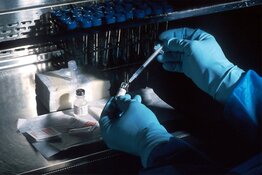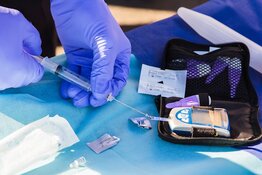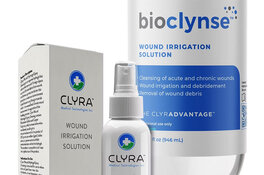Sernova Biotherapeutics Inc.'s (SVA:TSX.V; SEOVF:OTCQB; PSH:XETRA) investigational Cell Pouch Bio-Hybrid Organ has shown encouraging clinical trial results, and its pipeline is intriguing, but the biotech needs cash to advance its clinical programs next year, reported Dr. Andre Uddin, Research Capital Corp. analyst, in a June 16 research note. The clinical-stage cell therapy biotech company is developing a cell replacement therapy platform aimed at functionally curing several diseases including type 1 diabetes (T1D), hypothyroidism and hemophilia A.
"Cell Pouch is well-positioned in the T1D clinical development landscape," Uddin wrote. "We continue to believe that the company will need to secure additional funding in the near term," Uddin wrote.
275% Implied Return
Research Capital maintained its CA$0.60 per share target price, reported Uddin. He noted that positive data from the upcoming Cohort C of the ongoing Phase 1/2 clinical trial in T1D could be "a meaningful value inflection point."
The biotech's share price at the time of Uddin's report was CA$0.16 per share, the analyst noted. From there, the return to target is 275%.
Sernova is a Speculative Buy. Its market cap as of June 16 is CA$52.56 million (CA$52.56M). Its 52-week range is CA$0.15–0.39 per share.
Capital Raised in Q2/25
Uddin reported that at the end of Q2/26, the biotech had US$2M in cash and US$4.2M in debt.
During Q2, in mid-April, Sernova raised US$4M from Navigate Private Yield Fund LP III, managed by Fraser Mackenzie Private Credit Inc. This loan is secured against the assets of Sernova, its U.S. subsidiary and Dr. Steven Sangha, a board member. The loan matures on April 16, 2026, and accrues fixed interest of US$400K for the first six months then at 14.25% per annum thereafter.
Sernova also raised US$1M through a convertible debenture financing with Sangha. The biotech issued him 9 million common share purchase warrants, exercisable at US$0.20 per share for 36 months and subject to a four-month trading hold from the issuance date.
"The recent debt financing rounds extend Sernova's cash runway through approximately Q4/25," Uddin wrote.
To that end, Sernova currently is looking into funding opportunities with GoldTrack Ventures and the Kingdom of Saudi Arabia, potential sources of capital.
Q2/25 Net Loss
During Q2/25, as Research Capital expected, Sernova did not generate any revenue, like in 2024. The biotech reported a net loss of US$3.8M, an improvement over Q2/24's much greater net loss of US$9.9M. In comparison, Research Capital's net loss estimate for Sernova was higher at US$5.3M.
"Earnings remain less important at this stage as Sernova continues to operate as a clinical-stage cell therapy biotech company," wrote Uddin.
Positive Interim Data
Sernova announced interim data from its Phase 1/2 T1D clinical trial, which were positive. Reported results were for Cohort A patients, implanted with the 8-channel Cell Pouch, and for the ongoing Cohort B patients, implanted with the 10-channel Cell Pouch.
Eight out of 12 patients achieved insulin independence, and seven out of 12 patients maintained functional islet cell activity demonstrated by C-peptide levels greater than 0.3 nanograms per milliliter. BETA and BETA-2 scores and Cell Pouch histology supported functionality of the transplanted islet cells. As for glycemic control, nine out of 12 patients showed HbA1c levels below 7%, the American Diabetes Association's recommended threshold.
Of the other three patients, one improved to 7.8% from a baseline of 10.3%, and the other two dropped below 7% from baseline, where their levels stayed.
"We believe the trial is on track to meet its primary and secondary endpoints," Uddin commented.
The primary endpoint is the safety and tolerability of the Cell Pouch following implantation, and islet transplantation.
Secondary outcome measures are: survival of endocrine tissue in the Cell Pouch, proportion of patients with fewer hypoglycemic events at three points in the study; and proportion of participants with a reduction in HbA1c greater than 1mg%, at three points in the study after final Cell Pouch transplant.
Changes in Leadership
Uddin reported the company's changes to management. Chair Ross Haghighat resigned, so Sernova has appointed its chief executive officer Jonathan Rigby as interim chair until it finds a replacement. Also, Chief Business Officer Dr. Modestus Obochi left the company.
Further, in late May, Sernova created a clinical advisory board, all in the diabetes or endocrinology field. Dr. Robert Gbbay is the board chair, and members are Dr. Mark Atkinson, Dr. Melena Bellin, Dr. Andrew Posselt and Dr. Holger Russ.
Near-Term Catalysts
Investors should watch for enrollment of Cohort C patients for this same study, who will be implanted with the 10-channel Cell Pouch and receive optimized immunosuppression. This process is to begin before 2025 ends. Subsequently, Cohort C will be dosed, and this component of the study will be completed in 2026.
Also next year, Sernova will initiate its trial using Evotec's induced pluripotent stem cells.
| Want to be the first to know about interesting Medical Devices investment ideas? Sign up to receive the FREE Streetwise Reports' newsletter. | Subscribe |






































